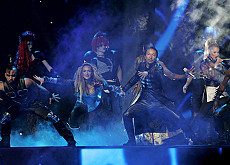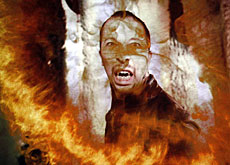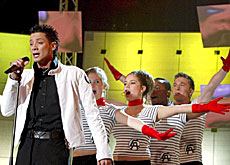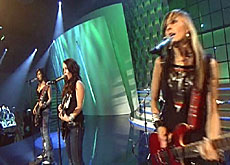DJ Bobo’s Vampires get spiked

Switzerland's DJ Bobo is out of this year's Eurovision Song contest in Helsinki after he failed to qualify in the preliminary round of the popular competition.
The Swiss singer’s elimination was a shock for most observers, who had put his controversial “Vampires are Alive” song among the favourites to win this year’s event.
Bobo is a household name in Switzerland and has fans across Europe. On Friday he spoke of his disappointment at not finishing among the top ten for a place in Saturday’s final.
“It wasn’t an optimal performance. I wasn’t on best form,” the singer was reported as saying.
But he told Swiss television that the bloc voting by east European countries had been “frustrating” and had been at the expense of western European entrants.
“My ego has taken a real knock,” he added.
Bloc voting
Out of 28 candidates trying to nail one of the places for the final, nine of the acts which qualified for Saturday came from eastern Europe – with Turkey the only outsider to make it through.
The 39-year-old, who had a worldwide smash hit with “Chihuahua” in 2003, was chosen to represent his country at the end of last year after a string of Swiss flops at the event.
Initiated by the Geneva-based European Broadcasting Union in 1956, Eurovision is one of Europe’s most popular annual music events. Switzerland has only won twice, the last time in 1988 when it was represented by Canada’s Céline Dion.
Previous attempts to inject an international flavour into previous Swiss performances met with some success, although there were no wins. Estonian girl band Vanilla Ninja finished eighth in 2005 and multinational group six4one ended up 16th last year.
“The problem is that eastern European nations award each other points,” said Toni Wachter of Swiss public television DRS. “We are going have to think about how important this is to us and how we should proceed.”
Satanic content?
The Swiss thought they had found a way of ending years of frustration by selecting Bobo, an established name. He has toured in 44 countries and has sold more than 13 million records during his career.
But his song for the Eurovison contest courted controversy at home. Christian fundamentalists called for the Swiss entry to be banned because of its allegedly satanic content.
The Federal Democratic Union handed in a 49,000-signature petition to the government condemning “Vampires” as an affront to people’s religious convictions.
The petition accused Bobo of trivialising hell and Satan and said his “occult lyrics” are beyond the pale. Offending lyrics included lines such as “Free your spirit after midnight, sell your soul” and “From heaven to hell, enjoy the ride”.
The backers of the petition also claimed states that the Eurosong contest was increasingly becoming a platform for “the occult and Satanists”.
Last year’s surprise Finnish winners Lordi wooed fans with their “monster rock” and also faced accusations of being a satanic group – something they denied.
Bobo’s song also came under fire from the Swiss Evangelical Alliance, which appealed to the singer to change the lyrics. It warned that the song might send young people who were mentally unstable over the edge.
swissinfo with agencies
DJ Bobo was born René Baumann in Kölliken in northern Switzerland on January 5, 1968. He began his DJ-ing career in 1985 and a year later was runner-up in the Swiss DJ Championships.
His breakthrough came with the smash hit “Somebody Dance With Me”, which became number one in the Swiss single charts in March 1993. It was also a top-ten hit around the world.
He has released around 30 singles and 15 albums in a career, dating back almost 20 years.
Before the semifinal, 14 countries were already selected for Saturday’s Eurovision final.
Ten of them qualified by reaching a top-10 position in last year’s contest.
The four biggest financial backers – Germany, Spain, Britain and France – qualify automatically under the rules.
Belarus – Koldun
FYR Macedonia – Karolina
Slovenia – Alenka Gotar
Hungary – Magdi Ruzsa
Georgia – Sopho
Latvia – Bonaparti.lv
Serbia – Marija Serifovic
Bulgaria – Elitsa Todorova and Stoyan Yankoulov
Moldova – Natalia Barbu
Turkey – Kenan Dogulu

In compliance with the JTI standards
More: SWI swissinfo.ch certified by the Journalism Trust Initiative



You can find an overview of ongoing debates with our journalists here. Please join us!
If you want to start a conversation about a topic raised in this article or want to report factual errors, email us at english@swissinfo.ch.